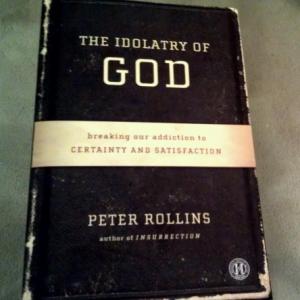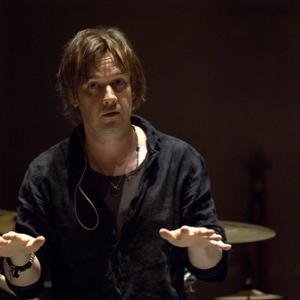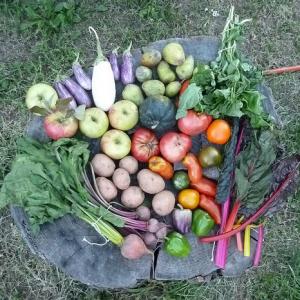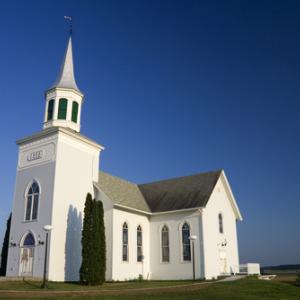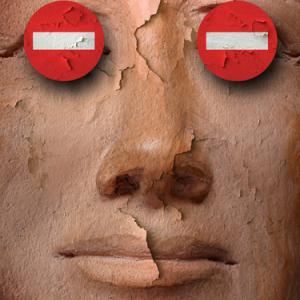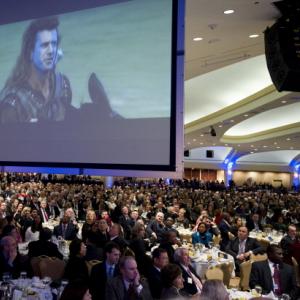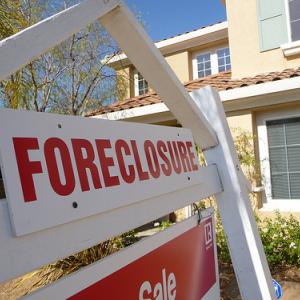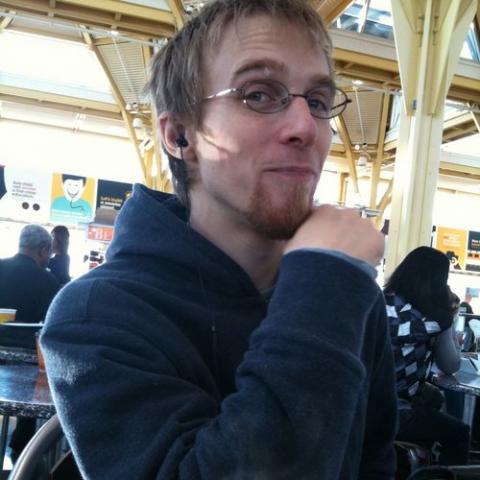
Jeremy John is a Christian, activist, and blogger, (in that order). He is a participant in OccupyDC's lay chaplaincy. In 2003, Jeremy spent six months in prison to close the School of the Americas, converting to Christianity while he was imprisoned. He is a contributor to the Good Men Project, Geez, most recently Red Letter Christians, and writes on his personal blog, Glass Dimly.
Posts By This Author
Lent: Falling in Love With the Ordinary
For me, joy in the everyday begins with food. If I can take time to make food and drink holy, if I make my table a place of family and community, a place of health and wellness, a place of good choices that sustain creation, I am grounded. Food is the place where I began my journey towards social justice, as a self-righteous young vegetarian who lusted after meat.
Food is the thing we all have in common, and with it, Jesus set forth the Eucharist. Is that enough for you to believe food is important?
Do you ever wonder why Paul spends so much time advising his churches on food and dinner manners? It's because the Eucharist was a wine-and-bread-leavened feast that intentionally leveled the strict hierarchy of Roman society. This enables Paul to confidently state, "There is no longer Jew or Greek, there is no longer slave or free, there is no longer male and female; for all of you are one in Christ Jesus."
Nonviolent Resistance Through Fantasia: On Peter Rollins' 'Idolatry of God'
"They look like big, good, strong hands, don't they. I always thought that's what they were. Ahh, my little friends, the little man with his racing snail. The nighthawk. Even the stupid bat. I couldn't hold on to them. the Nothing pulled them right out of my hands. I failed." -Rock-biter, in The Neverending Story
In the movie The Neverending Story, there's an alternate reality called Fantasia made up of all the hopes and dreams of humankind. But gradually people have stopped believing, hoping, dreaming, and wishing. And so a mysterious someone seized the opportunity and unleashed a dark void that gradually devours all the beautiful creations. The Nothing. The creatures of Fantasia are powerless to stop it. Why was the Nothing unleashed?
Waiting for God in the Dark Night of the Soul: On Peter Rollins' Atheism for Lent
I love Peter Rollins' honesty about his dark night of the soul.
He's popularized a term for the intellectual position accompanying the dark night of the soul: a/theism. I interpret Peter's thought as being in relation to an experience of God's absence. [Note: corrected this paragraph's content from "even coined" to "popularized. Turns out another author coined a/theism."]
I thought it was hilarious that Tony Jones challenged Peter to give up atheism for Lent on the Homebrewed Christianity podcast.
But I took it seriously when Micah Bales, one of my best friends, wrote a post challenging Peter Rollins' Atheism for Lent. You can't give up God because God is a felt presence. (Peter later responded to Micah. And Brian Merritt a piece about who Micah is.) Our conversations got me thinking about what I value about Peter Rollin's voice and what I might challenge about a/theism as I understand it. In order to talk about why a person believes or disbelieves in God, you have to talk about a personal spiritual journey.
Is the Kingdom of God Made of Vegetables?
“Another world is not only possible, she is on her way. On a quiet day, I can hear her breathing.”
~ Arundhati Roy
Vegetables.
Who could have imagined an economy in which gentle vegetables were subversive?
But this is our world. A world where a vegetable, whose growth is imperceptible to the naked eye, can spider a crack into the concrete of our industrial food system.
We find ourselves in a food economy that sickens us. Health is divided along race and class lines: the food economy particularly sickens those whose wages do not allow them to buy the foods that can cure us of the diseases industrial “foods” cause.
Corporations, which do not speak the language of human love and health, wrangle to profit from the stream of ill Americans falling from the industrial foods conveyor belt. But we know that type 2 diabetes, heart disease, obesity, and some cancers are fully preventable by replacing part of what we eat with fruits and vegetables.
Why, in a wealthy, fertile country are we wrecking the environment to produce foods that kill us?
Physical Churches: Do They Matter Anymore?
Micah Bales asked a deep question. He suggests that the wealth in property we’ve inherited is hindering our work for social justice. He talks provocatively (as a spiritual challenge, he clarifies) about “burning the meetinghouse.” He asks, “What would happen if we put the movement of the Spirit ahead of property management?”
As I passed churches the other day I asked myself, “If there are so many churches in America, why does America look so unlike the Kingdom of God? Why are we strangers to our neighbors? Why do we have homeless poor among us? Why do sweatshops produce the majority of our goods? Why do we have the greatest per-capita incarceration rate in the world? Why are we choking the earth with fossil fuels?”
Many non-Christians lay the sins of our nation and even the world at the feet of the church. After all, a 77 percent of us self-identify as Christians (in 2009). So why is it that the Christian faith, the self-avowed enemy of greed, has allowed this world to happen?
I think that our churches have been slowly converted by the logic of the market, a logic which Paul called “the world.” Jesus called his disciples to disregard the economy, and later, in the midst of the Roman empire, the Acts church built centers of economic and spiritual wholeness that offered a concrete alternative to the mandatory emperor-worshipping cult which was physically represented by Caesar’s head on the golden coin: the money system. There was a prophetic imagination alive in the Acts church.
Social Location at the Goose
At Wild Goose, I was humbled to be among justice-seeking Christians seeking to follow in the footsteps of Jesus.
I see a deep connection between the personal practice of simple living and activism for social change. While I struggle to live justly, particularly in my everyday purchasing decisions (as Julie Clawson advises!), I often don’t live as simply as I could. Sometimes I take shortcuts, going out for lunch, driving my car to work, or buying something to solve a problem that actually requires time I lack because of overcommitment.
As Mark Scandrette points out, for many of us, our slavery to time and money is a choice. We could cut much from our lives and live more simply. We are the global 1 percent.
It’s this voluntary reconsideration of wealth and rediscovery of our Christian justice tradition that made Wild Goose such an amazing experience.
The Table is the Microcosm of a Practical Faith
 My generation is a practical generation, and I am challenged by my faith to be a practical person. Don’t get me wrong: I love all verbal and theological things: story, theology, politics, and history, perhaps even inordinately.
My generation is a practical generation, and I am challenged by my faith to be a practical person. Don’t get me wrong: I love all verbal and theological things: story, theology, politics, and history, perhaps even inordinately.
But I believe in places. I believe that relationships, rooted in love, transform us. And it just so happens that most lasting human relationships are formed around the table....
The table is a place where we bypass rank and privilege and create a zone where you take what you need and bring what you are able. It is a commons where we are defined in new, equal relationships with one another, ensuring that all have enough and sharing. Believers in Acts took the idea of the common table even further and held all possessions in common, caring for the widows and dispossessed from the surplus, bypassing the inequality created by the currency stamped with the deified Caesar.
When a System Demands Our Allegiance Away from Christ
When I am faced with dishonesty and fraud on a systemic scale, I ask my questions of God. But I am continually directed back to humanity itself to find the origins of injustice.
So what can we do to end injustice?
The Washington Post reported on the massive falsification of documents by banks:
“Employees at major banks who churned out fraudulent foreclosure documents, forged signatures, made up fake job titles and falsely notarized paperwork often did so at the behest of their superiors, according to a federal investigation released Tuesday....
"‘I believe the reports we just released will leave the reader asking one question: How could so many people have participated in this misconduct?’ David Montoya, HUD inspector general, said in a statement. ‘The answer: simple greed.’”
Foreclosure Resistance: A Prayer

Foreclosure image via Shutterstock (http://www.shutterstock.com/pic-32385181/stock-photo-home-for-sale-price...)
The question is, are we listening? For God, who hears the prayers of God's people, is calling us to listen as well. God's justice is a collective project.
But when we listen, we hear stories of oppression, corruption, and injustice, in the face of honesty and hard work. But listening is not enough. When we listen, God calls us from the quiet of prayer to be a healing presence in the world.
"She looks well to the ways of her household, and does not eat the bread of idleness." - Proverbs 31:27
Occupy Breakfast
What does it mean to be a Christian when organizations such as The Family create a Jesus that does not hear the prayers of the poor? An organization that prays to the powerful in place of God? That participates in the global crucifixion of the poor by turning Jesus' cross into a social ladder for politicians to climb upwards, past the broken body of Christ? To cultivate relationships with dictators?
To cultivate the most powerful for political influence, to create an elite society for the elite, is that listening to the prayers of the people?
I ask you, was Jesus a political networker? Did he hobnob with the most powerful? Did he cultivate relationships with the dictators of his time, Herod and Pilate?
Our political class does not hear the prayers of the poor, they hear the "prayers" of corporate lobbyists who fund their campaigns. And they hear the prayers of Christians such as Doug Coe and The Family at the National Prayer Breakfast, because they offer connections, votes, and money.
Black Friday: The Anti-Thanksgiving
Today is Black Friday, the unofficial holiday immediately following Thanksgiving. Today, businesses open very early, offering reduced prices on all manner of consumer items. Customers are encouraged to flood the aisles in search of a good deal on all kinds of things - from DVDs to appliances - but, above all, electronics.
Radical Economic Justice: Jesus Forgave Sins and Debts
Alone, we do not have the power of Christ to forgive sins. But as the church, the body of Christ on earth, we do. I believe there is a seed of our faith that has been planted by the dissident occupiers, towards the forgiveness of debt that was Christ's deep desire for us, so much so that he told us to repeat it in our daily prayer. It's this way that we, by our holy treatment of our community's economic relations, water the seed of faith, until it grows into a sheltering oak, the Kingdom of God.
If our structures, our societies, do not allow us to practice Jubilee, or forgive debt as Jesus teaches, we need to work to change that. Christians must clamor for debt forgiveness. We need to be the voice, as Jesus was, proclaiming Jubilee.
But I don't believe that we are helpless. I believe that we live in an age of peaceful, nonviolent protest where we can carry the witness of Christ's radically forgiving love into the streets.
